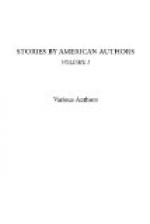It would have been strange, with Barwood’s habits of retrospection and continual casting about for the rare and curious, if the subject matter of his conversation with the old painter at Gruyere’s had not taken some hold upon his imagination. But to explain the rapidity with which the notion there suggested grew, and the absorbing interest with which it finally held him, would be difficult. The influence of the mind upon the body is known. By persistent direction of thought one can both create and cure a pain in any specific spot of his organism. The mind has a similar power over itself. By intense concentration upon one subject it may suspend and finally destroy its faculty of interest in any and all others.
The idea that the price of the treason of Judas is still extant and current in these every-day, commonplace times is at first sight utterly incongruous and incredible, perhaps a little sacrilegious. Yet it is evidently plausible. “The precious metals are indeed indestructible, as Megilp has said,” soliloquized Barwood. “They do not oxidize. The most violent excesses of the elements have no effect upon them. If not still extant, where then are the treasures of the ages?
“Buried under ground or in the ocean.
“What proportion of the whole has been thus disposed of?
“In the absence of statistics a definite amount cannot be stated, but from the nature of the case it cannot be large. This form of wealth has been too highly esteemed, too jealously guarded, and too rigorously sought for when lost. In the wars and convulsions of society it has changed hands but it could not be destroyed. Alexander and Tamerlane and Timour the Tartar and Mahomet might overrun the world, burning and destroying, and melting its more fragile riches like frost-work. But the money of the vanquished was useful to the victor for his own purposes. Rome took from Alexander, the barbarians from Rome, and modern civilization from the barbarians. The waves of time roll over and engulf all the monuments of men, all that gold and silver buy and sell, and, as it were, create; but these irrepressible tokens themselves float and glitter in the foam-crests upon those very billows. It cannot, then, be doubted that the instruments and accompaniments of most of the pomp and luxury, the war, treasons, and varied mercenary crimes of the world, are still acting their part in it.
“And why not with the rest the fatal money which Judas cast down before the chief priests in his remorse, going out to destroy himself?”
These were the reflections that recurred again and again to Barwood, and possessed him with a strange fascination. All coins acquired a new and intense interest. He saw in each the exponent of centuries of human passions and activities. It is true that in a country like our own a large part of the coinage is fresh from the mine. Yet his occasional encounters with foreign, especially Mexican and Canadian pieces, and a consideration of the immense sums received at the great ports of entry, were, in his regard, sufficient to leaven the whole.




